Chronic Fatigue Syndrome (CFS) is a complex condition that can have a significant impact on an individual’s mental health. Many people with CFS experience a range of psychological symptoms, including anxiety, depression, and cognitive dysfunction. In this article, we will explore the link between CFS and mental health, and the impact that this can have on individuals living with this condition.
One of the most common psychological symptoms experienced by people with CFS is anxiety. This may be related to the unpredictable nature of the condition, and the uncertainty surrounding the severity and duration of symptoms. Anxiety can lead to a range of physical symptoms, such as chest pain, palpitations, and shortness of breath. It can also contribute to a cycle of fatigue and reduced activity, leading to a further decline in physical and mental wellbeing.
Depression is another common mental health issue experienced by people with CFS. The constant fatigue, pain, and other symptoms can make it difficult for individuals to engage in activities that they once enjoyed. This can lead to feelings of sadness, hopelessness, and a loss of interest in life. Depression can also lead to physical symptoms, such as changes in appetite and sleep disturbances, which can further exacerbate the symptoms of CFS.
Cognitive dysfunction is another common issue experienced by people with CFS. This may include problems with memory, concentration, and mental processing speed. This can have a significant impact on an individual’s ability to carry out daily activities, and can contribute to feelings of frustration and helplessness.
The link between CFS and mental health is complex, and may be influenced by a range of factors. For example, the chronic stress associated with living with a long-term condition such as CFS can lead to changes in the brain and the release of stress hormones, which can impact mood and cognitive function. Additionally, the physical symptoms of CFS can limit an individual’s ability to engage in social activities, which can lead to social isolation and a sense of loneliness.
It is important for individuals with CFS to seek support for their mental health as well as their physical symptoms. This may include talking to a healthcare professional, such as a psychologist or counselor, who can provide strategies for managing anxiety and depression. Additionally, support groups and online forums can be a helpful source of peer support, allowing individuals to connect with others who understand their experiences.
In conclusion, the link between CFS and mental health is complex, with many individuals experiencing a range of psychological symptoms such as anxiety, depression, and cognitive dysfunction. It is important for individuals with CFS to seek support for their mental health, in addition to their physical symptoms, in order to improve their overall wellbeing and quality of life. With the right support, it is possible for individuals with CFS to manage their symptoms and lead fulfilling lives.








the line is blurry to be honest, you really need to have a strong mind, don’t doubt yourself, just hold on to it and don’t let it break you.